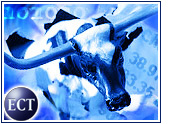
Those who have watched e-commerce grow up probably had a lump in their throats when they read the news that research firm IDC predicted worldwide online sales will reach the US$1 trillion mark in 2002.
A trillion dollars. It doesn’t exactly roll off the tongue, especially when it appears in the same sentence as e-commerce. Trillion is a figure normally reserved for describing budget deficits or the number of grains of sand on all the beaches of all the oceans in the world.
Turns out all those millions do add up. Amazon already has proved that hundreds can add up to a billion, the amount the e-tailer raked in during its fourth quarter. String together a thousand Amazons, and bingo! You’ve got your trillion.
So, what does it mean to measure e-commerce in trillions? Surprisingly little.
Millions and Billions
E-commerce and trillions have been associated for a while, but usually only in terms of long-range, pie-in-the-sky, sort-of-educated guesses. IDC’s forecast for a trillion is for this year.
It’s a milestone, to be sure. There was a time, probably not more than half a generation ago, when not a single dollar was spent on e-commerce. How’s that for a growth rate?
But what does this particular milestone mean? It means e-commerce adoption is moving forward at a steady pace, eating up big chunks of spending along the way. But those chunks come largely from businesses. More than 80 percent of the total e-commerce jackpot in 2002 will stem from business-to-business (B2B) e-commerce.
Hidden Jewels
There’s nothing wrong with that, of course, but B2B is like an underground city: There’s as much hustle and bustle and as many big-time deals, high-flying companies and spectacular failures as in retail e-commerce, but almost no one can see it.
The biggest B2B Web sites could be raking in millions of dollars right under our noses, but few of us will ever learn their names or obtain passwords to get past the splash page.
What good is that? Not much. B2B is the foundation of all e-commerce, but that doesn’t mean it’s the most exciting. Besides, who isn’t suspicious now about B2B e-commerce in the wake of the Enron fiasco?
Proof Positive?
Certainly, the trillion-dollar milestone should be good for something. Maybe it can bring respect to e-commerce and make it a force to be reckoned with. Again, not too likely.
The people who brush off e-commerce are likely to continue doing so. And e-commerce wins converts not by flexing its muscles or flashing wads of cash, but by keeping its nose to the grindstone and gaining fans one at a time.
A trillion dollars. That’s really nothing more than a neat fact to share at cocktail parties. What would be impressive? Two trillion. Now, that’s real money.
What do you think? Let’s talk about it.
Note: The opinions expressed by our columnists are their own and do not necessarily reflect the views of the E-Commerce Times or its management.


























































IDC’s numbers are always valuable, but I’d be most interested in seeing a break-out of in-country vs. cross-border eCommerce revenue. For example, Amazon’s recent international numbers were for revenue generated WITHIN its German, French markets, etc. When we know how much is traded online BETWEEN such nations, we’ll have a better grasp of the value of global eCommerce.
Keith asked: “what would be impressive?” Well, it’d certainly be a heck-of-a-lot more than the 4th quarter 2001 B2C sales that the Commerce Department just announced — which were only 1.2% of total retail, and only one-tenth of one percent greater than in the 4th quarter of 2000. And in light of such paltry growth, I’d like to suggest that the only way B2C sales can ever be impressive is by illuminating and resolving what I sincerely believe to be the largest and most unrecognized constraint — specifically: the missing function of “stores” as discussed at http://www.fastlaundry.com